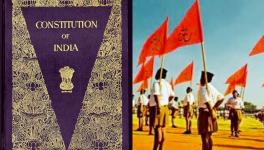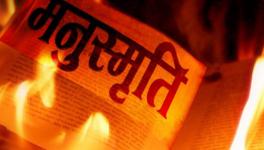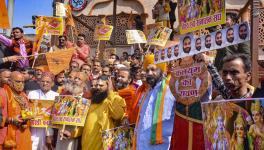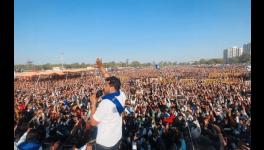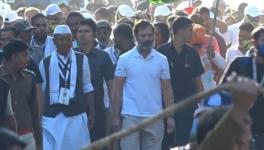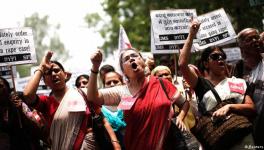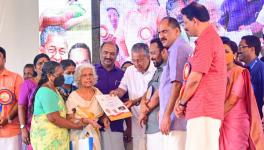Four Reasons Why PM Modi is Wrong About Cows
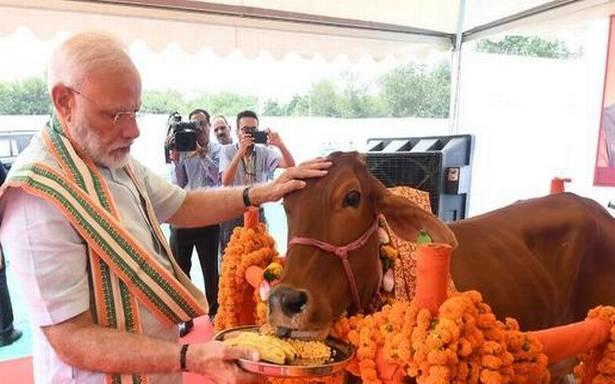
Speaking through his fictional detective Sherlock Holmes, Arthur Conan Doyle once said, modesty is not a virtue since it encourages people to view matters inaccurately. Prime Minister Narendra Modi seems to belong to the Conan Doyle school of thought. At a rally in Mathura on Wednesday, he told his audience that in 100 days in office he had done abhutpurva (literally, unprecedented) work.
Thus, with the economy on the verge of meltdown, the Kashmir Valley practically under martial rule, Modi Mark II has truly outdistanced the pretty corrosive version we saw between 2014 and May 2019. And, as if to underline just how robustly he, the Bharatiya Janata Party (BJP) and the Sangh parivar thrive on division, exclusion and intimidation, the prime minister signalled two issues that had no bearing on each other and one of which was certainly not apropos.
At the same rally in Mathura, Modi said the word ‘Om’ raises the hackles of many people. “It is unfortunate that in our country the moment the word ‘Om’ falls on the ears of some people, they get alarmed,” he said. Obviously, this slur was aimed at ‘westernised’ left-liberals, but equally obviously this is just something that Modi’s speechwriters or, perhaps, he himself, dreamed up, to harp on one of the many lines of divide that he and his party use to consolidate electoral constituencies: the so-called divide between India and Bharat. There is no factual basis to the claim that people get ‘alarmed’, with their hair standing on end, whenever they hear the word ‘Om’.
Practically in the same breath, Modi said that the same reaction can be expected when the word ‘cow’ is uttered. ‘In the life of rural India,’ he said, ‘animal husbandry is very important. Can a family in a village survive without it? But I don’t understand why some people get an electric shock on hearing the word.’ Wow. We are most obliged to Modi for informing us, first, that animal husbandry occupies an important place in rural life and the agrarian economy; and, two, that there are people in India who experience (metaphorical) electric shocks on hearing the word ‘cow’.
If Modi meant that some people—usually the same left-liberals (but actually many unhyphenated liberals as well as people who are to the right on economic issues)—feel uncomfortable with the draconian amendments to laws banning or restricting cow slaughter, not cows, passed mostly in 2014, he is sort of getting there.
Many Indians feel uncomfortable with the drive against cow slaughter because of a number of reasons, none of them even remotely connected to ‘Hinduism, Hindu tradition’ or ‘Indian tradition’. Lest we forget, the Sangh parivar and the BJP are not the custodians of any of these, anyway. The discomfort with unqualified programmes for protecting cows and banning cow slaughter are caused by other factors.
First, there is a concern about nutritional security in a country where the state has failed to provide adequate food to the entire population after more than seven decades of independence. Beef is consumed as a source of cheap protein mainly by Dalit and tribal people, and Muslims. It is no secret that poverty and economic disadvantage have a high incidence precisely within these communities. (Which is not, of course, to say that other communities do not experience these problems.) Thus, draconian legislations to proscribe not just the slaughter of cows, but the possession of and trade in beef adversely affects the nutritional security of the poor and disadvantaged groups. There is very clearly discrimination at work here.
This points to a second issue, of cultural pluralism and community or individual rights. To rigidly enforce dietary uniformity is to infringe people’s right to eat what they want and to subject cultural diversity to a Procrustean bed measured out by the prejudices of one set of people. This is arbitrary, illiberal and against the spirit of constitutional democracy.
The third issue is the manner in which the diktats of BJP governments are carried out. If the ban on the slaughter of cows and possession of or transactions involving beef was enforced by legitimate agencies observing due process, including procedural recourse to the judiciary, the situation could have been defended from the point of view of the rule of law. However, these proscriptions are enforced most often by vigilantes, whose principal purpose is to intimidate minorities and marginal populations and who are more often than not affiliated to the Sangh parivar in one way or another. State governments run by the BJP have not taken steps to prevent the spate of lynching incidents related to possession of or trade in cattle or beef that have occurred since 2014. A good example of this nod-and-wink approach was demonstrated by the Rajasthan police, when the BJP was in power in the state. Their investigation was so shoddy that a court was compelled to release several people accused of murdering a man named Pehlu Khan, a dairy farmer who was lynched while bringing cattle he had bought back to his farm.
Finally, there is the question of ‘animal husbandry’, which the prime minister so sagely referenced in Mathura. Over the past few years, the agrarian economy has been hurt by a blanket ban on cattle slaughter and a de facto ban on cattle trade and transportation through vigilante action. Farmers who could not afford to maintain cows that were no longer productive used to sell them without bothering with where they ended up. This freed them from unprofitable expenditure and gave them seed money to buy new heads of cattle. With the cattle trade languishing, they just turn the unproductive cows loose. These stray cattle are forced to forage for food and in the process destroy crops. It’s a double blow.
It has been established that farmers tend to refrain from buying cows most often in areas where the proscription of cow slaughter, transport and trade are most severely imposed. This adversely impacts the typical farming family in a number of ways, most important of which is, again, nutritional security, because access to milk becomes more constricted. It need not really be spelt out how badly dairy farmers and the dairy economy is affected. Pehlu Khan comes to mind.
Livelihood options of the most vulnerable are also damaged. Many Dalit families make a living flaying the skin off dead cattle and processing it. Similarly, most people who work in the leather industry are Dalit or Muslims. As the leather industry faces declines in supply of raw and semi-processed leather, these workers are also badly affected.
This is the case against draconian action in relation to cow slaughter and trade, and the possession and consumption of beef. People’s hair does not stand on end when they hear the word cow. Modi is well aware of that, but figures that playing to the Hindutva gallery will trump the signal inability to pursue stated goals such as economic development.
But obscurantism is the BJP’s default template. Seen in this light, Modi probably got it right when he said that many people ‘feel as if the country has been dragged back to the 16th or 17th century’ when they hear the word cow. There is a qualification: Only when the BJP and Sangh parivar utter the
word.
Get the latest reports & analysis with people's perspective on Protests, movements & deep analytical videos, discussions of the current affairs in your Telegram app. Subscribe to NewsClick's Telegram channel & get Real-Time updates on stories, as they get published on our website.









